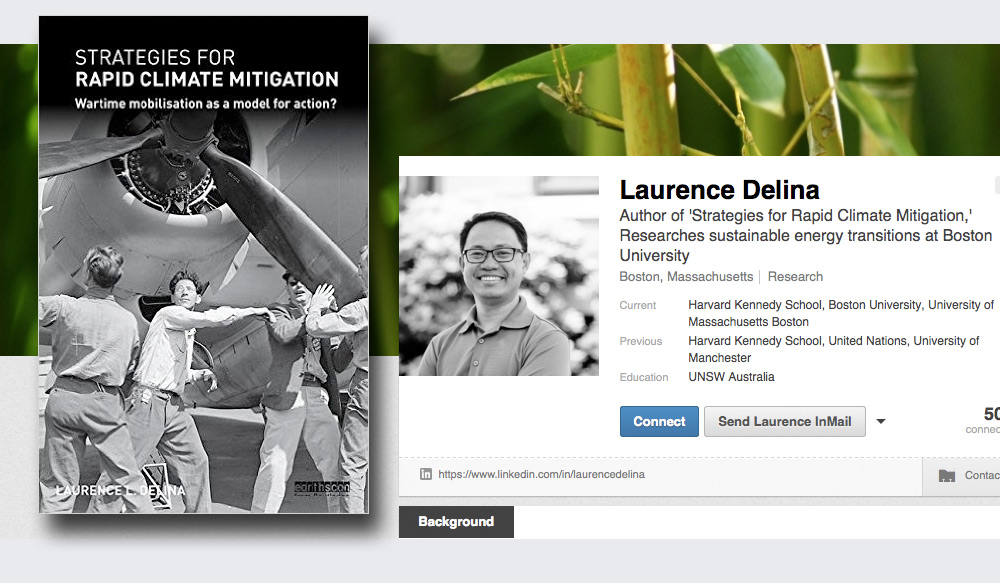University of New South Wales PhD candidate Laurence L. Delina has investigated the rapid, large, socio-economic changes made by several countries just before and during World War 2, wrote professor Mark Diesendorf from UNSW Australia in The Conversation:
“Laurence Delina found that we can learn from wartime experience in changing the labour force and finance. However, he also pointed out the limitations of the wartime metaphor for rapid climate mitigation:
- Governments may need extraordinary emergency powers to implement rapid mitigation, but these are unlikely to be invoked unless there is support from a large majority of the electorate.
- While such support is almost guaranteed when a country is engaged in a defensive war, it seems unlikely for climate action in countries with powerful vested interests in greenhouse gas emissions.
- Vested interests and genuinely concerned people will exert pressure on governments to direct their policies and resources predominantly towards adaptation measures such as sea walls, and dangerous quick fixes such as geoengineering. While adaptation must not be neglected, mitigation, especially by transforming the energy sector, should be primary.
Unfortunately it’s much easier to make war than to address the global climate crisis rapidly and effectively. Indeed many governments of “democratic” countries, including Australia, make war without parliamentary approval,” wrote professor Mark Diesendorf.
About the paper: abstract
‘Is wartime mobilisation a suitable policy model for rapid national climate mitigation?’
“Climate science suggests that, to have a high probability of limiting global warming to an average temperature increase of 2ºC, global greenhouse gas emissions must peak by 2020 and be reduced to close to zero by 2040. However, the current trend is heading towards at least 4°C by 2100 and little effective action is being taken.
This paper commences the process of developing contingency plans for a scenario in which a sudden major global climate impact galvanises governments to implement emergency climate mitigation targets and programs. Climate activists assert that rapid mitigation is feasible, invoking the scale and scope of wartime mobilisation strategies.
This paper draws upon historical accounts of social, technological and economic restructurings in several countries during World War 2 in order to investigate potential applications of wartime experience to radical, rigorous and rapid climate mitigation strategies. We focus on the energy sector, the biggest single contributor to global climate change, in developed and rapidly developing countries.
We find that, while wartime experience suggests some potential strategies for rapid climate mitigation in the areas of finance and labour, it also has severe limitations, resulting from its lack of democratic processes.”
» Download the paper: Wartime mobilisation for climate mitigation
» Journal article in ScienceDirect
Analogues between wartime mobilisations and rapid climate mitigation
UNSW Australia. 2011-2015. This project sought to identify and describe the mechanisms that resulted to the rapid deployments of wartime munitions during World War 2. The identified mechanisms are then used as blueprints for designing policy and approaches for rapid deployments of sustainable energy technologies. A journal article has been published in Energy Policy from this work.
A presentation was delivered for this work in Tokyo. Invited presentations in a conference at the Royal Society in London and a forum at the University of Melbourne were also delivered based on this project. ONGOING.
» Amazon.com: Strategies for Rapid Climate Mitigation: Wartime mobilisation as a model for action? (Routledge Advances in Climate Change Research)
» Read Mark Diesendorf’s article ‘Rapid transition to clean energy will take massive social change’ in The Conversation
http://www.facebook.com/ClimateEmergencyMobilisation/posts/973153319467032
» Share this on Facebook
Other research projects by Laurence L. Delina
Laurence L. Delina has conducted research at the Frederick S. Pardee Center for the Study of the Longer-Range Future at Boston University, USA. He is also a research associate at the Center for Governance and Sustainability at the University of Massachusetts Boston, an Earth System Governance Research Fellow, and a Visiting Fellow at Harvard Kennedy School.
Knowledge tensions in the Australian sustainable energy transitions
2014. This project examines the controversies concerning the crucial evolution of knowledge tensions that are shaping the narratives on energy transitions in Australia. It interrogates the role, credibility and authority of various types and sources of knowledge – experts and forms of expertise – under conditions of strong cognitive and normative uncertainty of the transition discourse. A paper has been presented from this research in Karlsruhe. ONGOING.
Strengthening the Climate Action Movement: What we can learn from social action groups
UNSW Australia. 2011-2015. This project sought to identify the elements, conditions and characteristics of effective and ineffective social change campaigns, and collect ideas on approaches, types of communication strategies and activities to ensure greater public engagement and action. These mechanisms are then used to inform strategies and approaches for strengthening the climate action movement. The project received support from the International Center on Nonviolent Conflict. A journal article has been published in Carbon Management from this work. Another paper is currently under review in a journal. ONGOING.
» See more research projects by Delina
» Laurence Delina’s profile on Linkedin.com
Related information
» Grist Magazine – 2 May 2013:
What would ‘wartime mobilization’ to fight climate change look like?
By David Roberts


